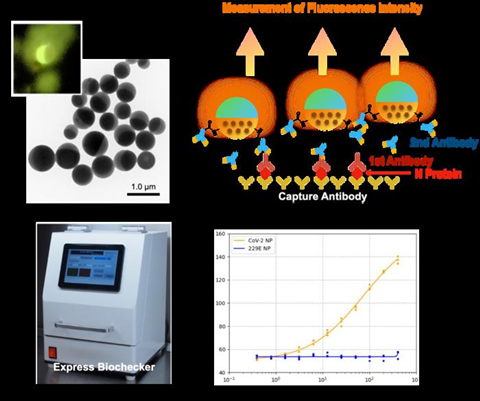The importance of testing for diseases was thrust into the limelight during the COVID-19 pandemic. Many of us have undergone a PCR (Polymerase Chain Reaction) or ELISA (Enzyme-Linked Immunosorbent Assay) test within the past four years.

Yet these forms of testing are far from perfect. They require large sample volumes, involve complex procedures, and even pose a risk of exposing the tester to the virus.
READ MORE: Study reveals how dopamine inhibits the expression of hepatitis B virus surface and e antigens
READ MORE: Origami paper sensors could help early detection of infectious diseases in low-cost test
Now, a group of researchers has developed a new quantitative testing system called the “Express Biochecker,” which provides a simple, rapid, and low-cost method for detecting the coronavirus N protein. This new system, which incorporates advanced microfluidic technology, is not limited to the coronavirus; it is expected to be applied to other viral illnesses such as influenza and hepatitis in the future.
Janus particles
“Our novel immunoassay system is based on Janus particles, which, much like the Roman god they are named after, possess two ‘faces’ or sides,” says Hiroshi Yabu, Principal Investigator and Deputy Director of the Open Innovation Center of Hydrogen Science for Green Transformation at Tohoku University’s Advanced Institute for Materials Research (WPI-AIMR). “One side is coated with a fluorescent dye, and the other with magnetic particles and antibodies.” These particles are engineered to bind specifically to target antigens, such as viral proteins, and can be used in conjunction with antibody-immobilized microfluidic devices for highly precise measurements.

“The strength of this system lies in its versatility,” added Eiichi Kodama, a professor at the International Research Institute of Disaster Science at Tohoku University. “Not only can it be used for viral detection in other diseases, but it also has the potential to be adapted for measuring other biomarkers related to various conditions. This could open new avenues for medical diagnostics.”
The next phase of research will focus on expanding the system’s applications to include the detection of other disease markers.
Details of the findings were published in the journal Langmuir on August 15, 2024. Also included in the research team was Professor Kentaro Totsu of the Micro System Integration Center, and Haplo Pharma Inc. (headquartered in Sendai, led by President Yoshihiro Otaki), which develops diagnostic devices for medical and healthcare applications.







No comments yet